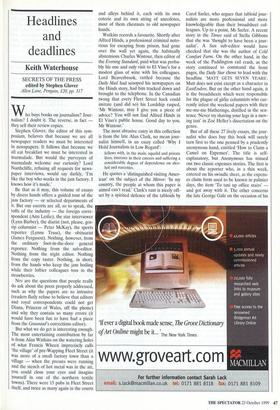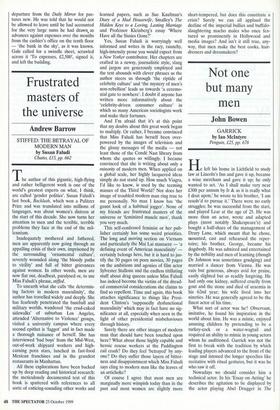Headlines and deadlines
Keith Waterhouse
SECRETS OF THE PRESS edited by Stephen Glover Allen Lane, Penguin, £20, pp. 317
Who buys books on journalism? Jour- nalists? I doubt it. The reverse, in fact they sell their review copies.
Stephen Glover, the editor of this sym- posium, believes that because we are all newspaper readers we must be interested in newspapers. It follows that because we all eat breakfast we must be interested in marmalade. But would the purveyors of marmalade welcome our curiosity? Lord Northcliffe, refusing all requests for news- paper interviews, would say darkly, `I'm like the boy who works in the jam factory. I knows how it's made.'
Be that as it may, this volume of essays by divers hands offers a guided tour of the jam factory — or selected departments of it. But our escorts are all, so to speak, the toffs of the industry — the foreign corre- spondent (Ann Leslie), the star interviewer (Lynn Barber), the diarist (not, please, gos- sip columnist — Peter McKay), the sports reporter (Lynne Truss), the obituarist (James Ferguson). Nothing, however, from the ordinary foot-in-the-door general reporter. Nothing from the sub-editor. Nothing from the night editor. Nothing from the copy taster. Nothing, in short, from the hands who keep the jam boiling while their loftier colleagues toss in the strawberries.
Nor are the questions that people really do ask about the press properly addressed, such as why the papers are so intrusive (readers flatly refuse to believe that editors and royal correspondents could not get Diana, Princess of Wales, off the phone) and why they contain so many errors (it would have been fun to have had a piece from the Grauniad's corrections editor). But what we do get is interesting enough. The most entertaining contribution by far is from Alan Watkins on the watering holes of what Francis Wheen imprecisely calls 'the village' of pre-Wapping Fleet Street (it was more of a small factory town than a village — when the presses were running and the stench of hot metal was in the air, You could close your eyes and imagine Yourself in one of the northern textile towns). There were 15 pubs in Fleet Street itself, and twice as many again in the courts
and alleys behind it, each with its own coterie and its own string of anecdotes, most of them chestnuts to old newspaper hands.
Watkins records a favourite. Shortly after Alfred Hinds, a professional criminal noto- rious for escaping from prison, had gone over the wall yet again, the habitually abstemious Charles Wintour, then editor of the Evening Standard, paid what was proba- bly his one and only visit to El Vino's for a modest glass of wine with his colleagues. Lord Beaverbrook, rattled because the Daily Mail had scooped his newspapers on the Hinds story, had him tracked down and brought to the telephone. In the Canadian twang that every Fleet Street hack could imitate (and did so) his Lordship rasped, 'Mr Wintour, may I give you a piece of advice? You will not find Alfred Hinds in El Vino's public house. Good day to you, Mr Wintour.'
The most abrasive entry in this collection is from the late Alan Clark, no mean jour- nalist himself, in an essay called 'Why I Hold Journalists in Low Regard':
fellows with, in the main, squalid and private lives, insecure in their careers and suffering a considerable degree of dependence on alco- hol and narcotics.
He quotes a 'distinguished visiting Amer- ican' on the subject of the Mirror: 'In my country, the people at whom this paper is aimed can't read.' Clark's rant is nicely off- set by a spirited defence of the tabloids by Carol Sarler, who argues that tabloid jour- nalists are more professional and more knowledgeable than their broadsheet col- leagues. Up to a point, Ms Sailer. A recent story in the Times said of Stella Gibbons that she was 'thought to have been a jour- nalist'. A Sun sub-editor would have checked that she was the author of Cold Comfort Pam On the other hand, in the week of the Paddington rail crash, as the story continued to command the front pages, the Daily Star chose to lead with the headline 'MATT GETS SEVEN YEARS'. Matt does not exist except as a character in EastEnders. But on the other hand again, it is the broadsheets which were responsible for the plague of girlie columnists who cur- rently infest the weekend papers with their me-me-me blatherings, distilled in the sen- tence 'Never try shaving your legs in a mov- ing taxi' in Zoe Heller's dissertation on the genre.
But of all these 27 lively essays, the jour- nalist who does buy this book will surely turn first to the one penned by a prudently anonymous hand, entitled 'How to Claim a Camel on Expenses'. The title is self- explanatory, but Anonymous has missed out two classic expenses stories. The first is about the reporter who, in a thin week, entered on his swindle sheet, as the expens- es claim form used to be known in palmier days, the item 'To taxi up office stairs' and got away with it. The other concerns the late George Gale on the occasion of his departure from the Daily Minor for pas- tures new. He was told that he would not be allowed to leave until he had accounted for the very large sums he had drawn, as advances against expenses over the months from the cashier's office on the tenth floor — 'the bank in the sky', as it was known. Gale called for a swindle sheet, scrawled across it 'To expenses, £2,500', signed it, and left the building.



















































































 Previous page
Previous page